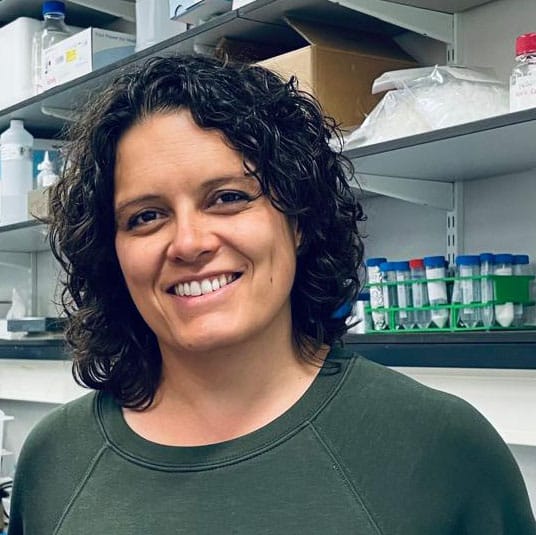A multiomic approach to unravel immunology behind pregnancy complications in SLE
General Audience Summary
Lisa van Baarsen, Ph.D., University of Amsterdam
Systemic lupus erythematosus (SLE) mainly affects women of childbearing age. Pregnancies in women with SLE are associated with an increased risk of devastating complications for the mother and baby, including fetal loss. The mother’s immune system plays a key role in pregnancy—it supports the proper formation of the placenta (the organ that forms during pregnancy and delivers nutrients to the fetus) and activates contractions and childbirth when the child is fully developed. The immune system normally rejects something it sees as foreign in the body, but a process called maternal-fetal tolerance ensures the fetus is not seen as a foreign body and rejected. This tolerance develops from the interaction between cells from the fetus and the mother’s immune cells. Whether the overactive immune system in people with SLE alters maternal-fetal tolerance is unknown. Dr. van Baarsen will test whether the altered interplay between placental cells and the mother’s immune cells seen in all women with SLE contributes to their increased risk of pregnancy complications .
Dr. van Baarsen will study the interaction of placental cells with the mother’s immune cells in healthy women compared with women with SLE, both with and without pregnancy complications. She will first use an innovative approach called spatial proteogenomics to study the molecular features of cells interacting at the maternal-fetal interface–the part of the placenta attached to the uterus. After identifying which cells may play a role in pregnancy complications, she will use laboratory models to study how these cells may affect maternal-fetal tolerance. Finally, Dr. van Baarsen will study the cells and proteins in the mother’s blood from a region of the placenta called the intervillous space, where the mother’s blood is in constant contact with the placenta cells. The team will pinpoint which cells and proteins are altered in women with SLE and pregnancy complications and study the function of these cells in their laboratory models. This analysis could identify biomarkers for the early prediction of pregnancy complications.
What this study means for people with lupus
Understanding how maternal-fetal tolerance is disrupted in women with SLE who have complications during pregnancy could help identify women at risk and enable the development of new ways to treat these devastating complications. Overall, Dr. van Baarsen’s findings could improve the outcomes of SLE pregnancies for both the mother and child.
Scientific Abstract
Systemic lupus erythematosus (SLE) predominantly affects women during their childbearing years. Unfortunately, up to 50% of SLE pregnancies are affected by complications such as preeclampsia, preterm delivery, growth restriction and fetal death. This has a devastating impact on the physical and mental health of these women and their children, and over 60% of women with SLE with a pregnancy wish have fewer children than desired. To better predict and prevent adverse outcomes of SLE pregnancies, it is crucial to understand the underlying biological processes.
Maternal-fetal tolerance is crucial for a healthy pregnancy and develops at the maternal-fetal interface (MFI) from interaction between fetal placental cells and incoming maternal immune cells. For healthy women, the development of maternal-fetal tolerance means that the risk of pregnancy complications decreases with subsequent pregnancies. In women with SLE the risk remains high during subsequent pregnancies, suggesting an intrinsic role for failing maternal-fetal tolerance in pregnancy complications in SLE. However, surprisingly little is known about cellular mechanisms mediating maternal-fetal tolerance or how the dysregulated immune system in SLE affects this process.
In this project we will address this knowledge gap by mapping and functionally studying two important MFI regions: the decidua, where placental trophoblasts interact with decidual maternal immune cells (aim 1), and the intervillous space, where syncytiotrophoblasts interact with maternal peripheral blood mononuclear cells and blood proteins (aim 2). This will be done using samples collected in our longitudinal FaMaLE cohort. In aim 1 we will create a blueprint of the cells, their phenotype and potential interactions in the decidua using spatial proteogenomics. This allows simultaneously measuring the expression of >18,000 genes and 40 proteins while retaining spatial information. Then, combining golden-standard 2D culture models and our novel 3D MFI organoid model, we will functionally study cells of interest to understand their potential contribution to the development of maternal-fetal tolerance and pregnancy complications in women with SLE. In aim 2 we will identify the cells and proteins present in maternal peripheral blood, using spectral cytometry (68 markers) and the wide-angle proteomic profiling SomaLogic platform (1500 analytes), respectively. Similar to aim 1, identified cells and proteins will be functionally studied for their interaction with syncytiotrophoblasts in vitro.
These data will illuminate how the cellular processes leading to maternal-fetal tolerance are altered in pregnant women with SLE and provide directions for potential therapeutic interventions. Additionally, the peripheral blood analyses will provide potential biomarkers for early prediction of pregnancy complications. Ultimately, these findings will contribute to improving SLE pregnancy outcomes with great benefits for both mother and child.




